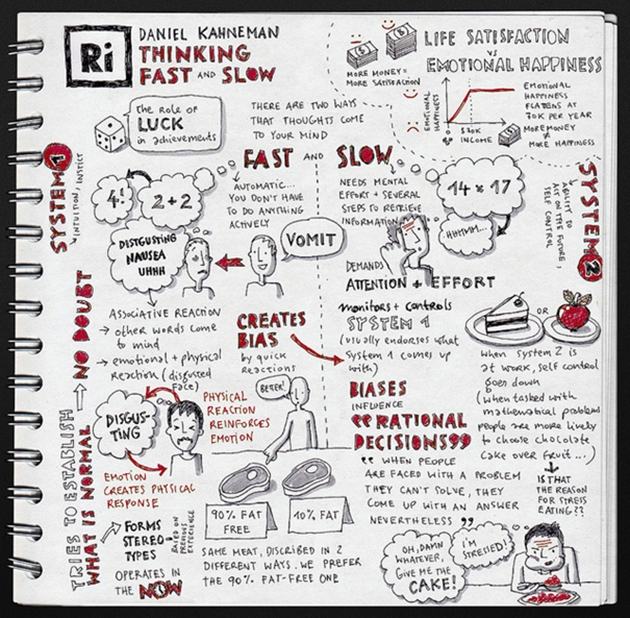For a long time, B2B marketers assumed that business decisions were based primarily on rational motivations and that emotion was an exclusive territory for B2C marketers. However, it's becoming increasingly apparent that emotion plays an important role in B2B as well.
Emotion and reason are two human traits that together—sometimes in agreement, but sometimes in conflict—lead to decisions. It's not one or the other, black or white.
According to behavioral scientist and Nobel Prize winner Daniel Kahneman, people have two modes of thinking for making decisions:
- System 1: fast, instinctive, emotion-driven
- System 2: slow, contemplative, reason-driven
When we try to persuade people we're right and we use logical arguments and lists of facts, we're pitching to System 2. But System 1 is faster and more powerful, and, in most cases, it has already decided. All those persuasive arguments are likely to go ignored if System 1 isn't already on your side. So, always have System 1 in mind when you're trying to win business or build your brand.
You speak to System 1 by making yourself easy to choose.
When you need to speak to System 1, which emotions do you as a marketer want to focus on? There are many options, including belonging, happiness, joy, fear, pity, shame, envy, love, sadness, anger, surprise, disgust, pride, devotion, astonishment, irritation, contempt, guilt, trust, security, and acceptance, just to name a few!
Different emotions trigger different behavior. To influence buying decisions, you can consider the following 14 marketing tactics.
1. Sell the how: solution-selling
Instead of selling features and functionality that explain what the product or service is, focus on how it solves problems. Don't sell what—sell how.
For instance, by demonstrating how new software will improve efficiency, you will make more impact than explaining how it works. The perceived value will be higher.
You can make a buyer proud, accepted, and happy at work when you help solve their problem.
2. Sell the why: belonging
In his book Start with Why, Simon Sinek argues that successful companies communicate primarily based on the premise why they exist (their raison d'être) and then how they fulfill their role.
Taking that path isn't always easy. Every company, business unit, or department can explain what they do. Some can even say how they do it. But only a few will be able to perfectly explain why.
We aren't referring to making profit, products or services; at best, that gets to the how. By selling the why successfully, you touch on a sense of belonging and acceptance of being part of a tribe.
3. Be likable and sell fun
This one is easy. People like to do business with people and companies with whom they have a positive association. By being likable, you are playing with joy and happiness.
4. Be an authority
A commonly used tactic in B2B content marketing is gaining authority by sharing knowledge and expertise to help others in their industry or field.
Ways to share knowledge can include speaking as a keynote on events, sharing new insights through research, and contributing to acknowledged industry media. You'll be appealing to people's capacity to trust.
5. Provide social proof
In B2B, marketing reference cases and best-practices are often used—and not without reason. Professor of psychology and bestselling author of Influence: The Psychology of Persuasion Robert Cialdini says, "If you can get people who are similar to the person you're trying to persuade to speak on your behalf, it's a lot easier for you than if you have to try to hammer your message one more time into a reticent mind."
People are first and foremost social creatures and look to others to determine what actions to take.
6. Create scarcity and promote exclusivity
Near the top of psychologist Abraham Maslow's hierarchy of needs pyramid sits self-esteem. People want to feel important, like they're part of an exclusive group. That's why advertising copy sometimes says: "We're not for everyone."
Creating exclusivity can be an effective tactic for reaching more specific and upmarket audiences.
7. Set core values
Core values are the fundamental beliefs of a person or organization. These guiding principles dictate behavior and can help people understand the difference between right and wrong. By creating an unwavering guide, core values also help companies to determine whether they are on the right path and fulfilling their goals.
8. Be novel
Human beings love novelty. Neurologically, it has been demonstrated, exposure to something new and unfamiliar increases the release of dopamine in the brain.
Novelty makes our brains sense a possibility for reward waiting for us just around the corner. That potential for pleasure motivates us to seek it out.
9. Be physical or demonstrate
In an increasingly digital world, most communication is digital as well. But reading, watching, and hearing content from a screen doesn't afford the opportunity to influence emotions activated by real-life experience. So, for some B2B markets, a physical experience in a demo center can be worthwhile. Also, customizing an online demo to a real-life situation can make an impact on confidence as well.
10. Tell a story
Human beings have been telling stories for thousands of years. It is how messages have been passed on from generation to generation. Why? Because they trigger emotions (and we are emotional creatures). In B2B marketing, storytelling can be an effective way to connect to customers. After all, people identify foremost with other individuals—not corporations.
11. Introduce fear, uncertainty, and doubt
Fear, uncertainty, and doubt are often used legitimately by businesses and organizations to make people think and change their behavior. Those emotions draw our reptilian brain—our instincts—and are therefore strong and effective.
You need to consider, however, whether you want to associate your brand with this somewhat negative approach.
12. Provide instant gratification
In B2B, many services have become fast and direct. Taking away hassle, shortening time to delivery, and personalizing services can provide instant gratification and satisfaction, which is a fantastic way to create fans (and make them addicted to your services).
13. Introduce reciprocity
Jay Baer argues in his book Youtility that your marketing should be so useful to your audience that people would be willing to pay for it. When you share valuable expertise, help, knowledge, or data, people are more likely to do something in return. It's the basic principle of the Godfather: "I do something for you, you do something for me."
14. Be better together
When you work together on a project, your commitment to the end result increases. It's no longer just a project, it has become your project, and failure is not an option. Many services today can be tailored to specific needs, and individual parts or modules can be integrated or assembled in a more flexible way; moreover, collaboration is facilitated in many ways.
In our modern economy, co-creation is on the rise, which is a great way to gain ultimate commitment!
* * *
Those are the 14 tactics you can use to speak to System 1. Market your product or service based on emotion first, but don't neglect System 2!





